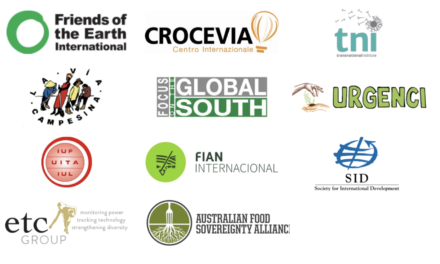The attack on the World Trade Centre is the most vivid: astonishing, shocking and immeasurable in its impact, releasing a thousand genies from their bottles, never to be put back: the war on terrorism, the clash of civilisations, the demonisation of Islam, the American loss of innocence manipulated into fear and nationalism. The world will never be the same.
While the attack that followed, the US bombing of Afghanistan (and with still no sign of bin Laden) is a potent reminder of cold, bloody military power and that militarisation will always be the “steel fist of the invisible hand.”
In Genoa, the police shot and killed a young protestor and, with pre-meditated precision, bludgeoned more than 60 people sleeping in a school. We were horrified at the violence of the “civilised” Italian state and at the silent sanction of the G8.
In spite of – or perhaps because of – this, tens of thousands of activists from all over the world will come to Porto Alegre again this January for the second World Social Forum: it seems that the more violent and oppressive the world becomes, the more people are willing to speak out and act, to resist and renounce the system.
And again this year, a small club of capitalists will gather in New York for the World Economic Forum – either banished from the Swiss resort of Davos or showing solidarity with Bush and his corporate cronies and they will be welcomed by protests and pickets in the first major anti-globalisation mobilisation in the US since September 11.
In this issue of Focus on Trade, Barbara Garson – a New York journalist, writer and sometime investor – explains why she'll be picketing the WEF on 5 February. Coincidentally, her book “Money makes the world go around” is also coming out that day. In this issue, Nicola Bullard reviews the book and maybe Barbara will sign copies on the picket line.
Also, in this issue Walden Bello writes that the “twin debacles” of Enron and Argentina have brought back with vengeance the crisis of legitimacy of the global elite and the corporations. Writing about the political and financial upheavals in Argentina, Focus' Spanish editor Gerard Coffey suggests that the US' main concern is political rather than financial contagion while Jeremy Brecher, Brendan Smith, Tim Costello and Dennis Brutus argue that the time is ripe to push for a debtor's cartel. Finally, Nicola Bullard looks at how the G8 is shaping up after Genoa, arguing that the events of September 11 have awakened a touching (but self-interested) concern about poverty and inequality but warns that all proposals for a “New Global Deal” and other such sales tricks should be checked against delivery.
IN THIS ISSUE
PORTO ALEGRE SOCIAL SUMMIT SETS STAGE FOR COUNTEROFFENSIVE AGAINST GLOBALIZATION
By Walden Bello
A SHAREHOLDER PICKETS OUTSIDE THE WALDORF
By Barbara Garson
THE TWIN DEBACLES OF GLOBALIZATION
By Walden Bello
G8 SEEKS REDEMPTION IN SEPTEMBER 11
By Nicola Bullard
ARGENTINA: POLITICAL CONTAGION POSES BIGGEST RISK FOR US
By Gerard Coffey
TWO, THREE, MANY ARGENTINAS?
PORTO ALEGRE CAN PUT A DEBTOR'S CARTEL on THE GLOBAL AGENDA
By Jeremy Brecher, Dennis Brutus, Tim Costello and Brendan Smith*
FOLLOW THE MONEY!
“Money Makes the World Go Around” by Barbara Garson, Penguin, New York, 2002.
Reviewed by Nicola Bullard







